15 Characteristics of Project Management in 2025: Different Processes and Frameworks Explained
From traditional to Agile and adaptive project management processes, each approach has its own unique set of characteristics. If you want to manage projects effectively, keep reading to learn about the key characteristics of project management processes.
As businesses grow and projects become more complex, understanding the characteristics of project management and utilizing the best project management software can make a big difference. This could significantly impact project delivery success because different methods need specific approaches to ensure efficiency and effectiveness.
However, comprehension alone is insufficient. Successful project managers also need reliable project management software for efficient planning, execution and completion of projects. Our curated list of the best free project management software can help you find the right one for your team and potentially save you money. We know you’re eager to learn, so let’s jump right in.
What Are the Characteristics of Project Management?
Project management is the practice of planning, organizing and executing tasks to ensure that a project is completed successfully. Project managers are responsible for managing all aspects of a project, including project scope, time, cost, quality, communication and risk management. Below, we’ll take a look at the fundamental characteristics of a project.
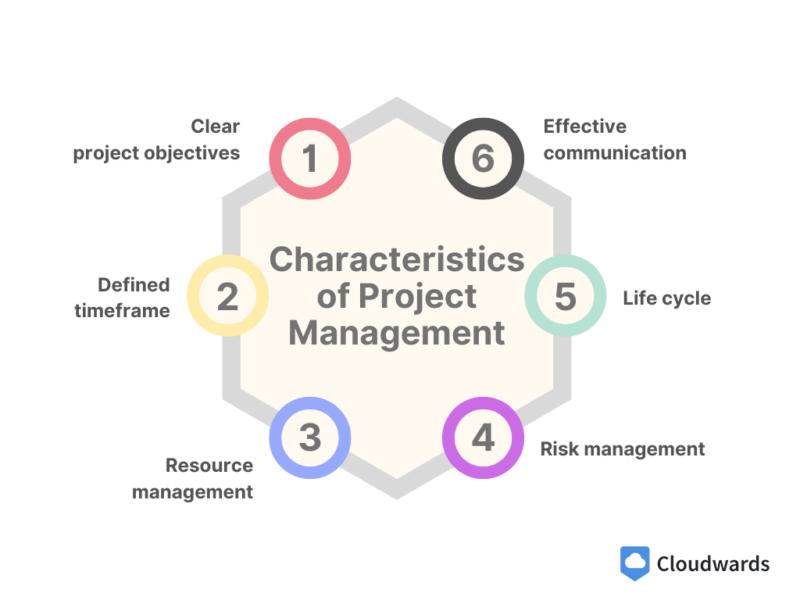
- Clear project objectives: Identify project objectives and set clear, measurable goals to ensure that every team member understands the desired outcomes. Project objectives are commonly set when creating project charters or scopes.
- Defined time frame: Set project timelines with specific deadlines for tasks and milestones. Effective time management also keeps the project on track and ensures that it is completed on time.
- Resource management: This involves identifying, allocating and managing necessary resources like people, equipment, materials and budgets. Check out our monday.com review for an efficient resource management software.
- Risk management: Identify project constraints such as budget limitations, time restrictions and scope boundaries to prevent or minimize their impact on the project’s success.
- Life cycle: This includes initiating, planning, executing, monitoring and closing the project. Understanding each stage of the project leads to better planning and resource allocation. You can learn more about project life cycles in our project management guide.
- Effective communication: Having clear and open communication among project team members, stakeholders and clients is key to successfully managing projects.
Avoid Costly Project Management Mistakes – Get Free Tips Today!

- Discover 10 fundamentals of project management
- Understand step-by-step plans for PM execution
- Learn tips to avoid 5 common mistakes by beginners
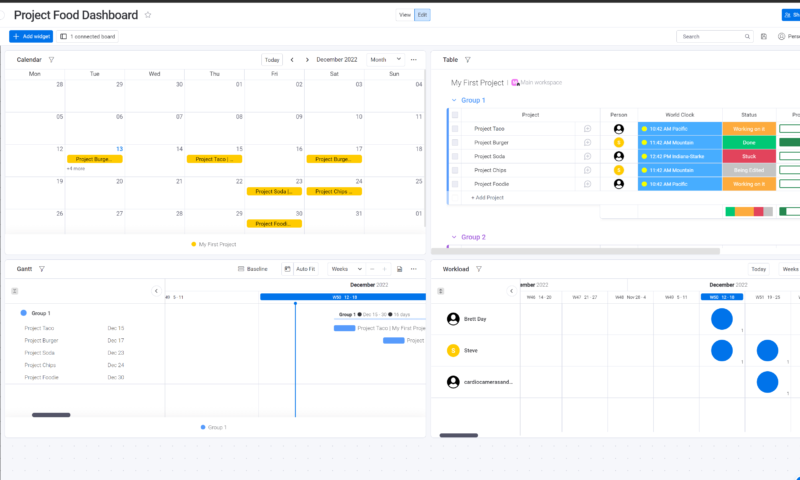
it easy to track tasks, resources and more.
Importance of Project Characteristics
Before we dive into the characteristics of different project management methodologies, let’s examine the importance of project management characteristics and see why it’s important to understand them.
- Predict project progress: With careful planning, you can anticipate how a project will unfold, allowing for better project outcomes. A clear project scope, or charter, will help prevent scope creep and keep the project focused on its intended outcomes.
- Identify potential risks: Discussing potential risks during planning can help project teams identify risks early on, which helps them develop mitigation strategies and minimize their impact.
- Enhance communication: Understanding project characteristics improves communication and collaboration among team members and stakeholders by clarifying project goals, timelines and requirements. Using RACI charts can also help teams understand who is responsible for certain tasks.
- Optimize resource allocation: When you know the specific project requirements, you can effectively allocate resources, control budgets and keep supply chains flowing.
- Perform quality control: Project characteristics establish quality standards. To create higher-quality products, you should monitor and evaluate the project’s processes against known benchmarks like team velocity. Monitoring quality will help you deliver project outcomes that meet stakeholder and client expectations.
The Traditional Approach: Characteristics of Waterfall Project Management
Developed in the 1970s, the Waterfall model is a sequential and linear project management method. It involves a series of distinct phases, where each phase must be completed before moving on to the next, which is similar to how Gantt charts work. Here are the key characteristics of Waterfall project management:
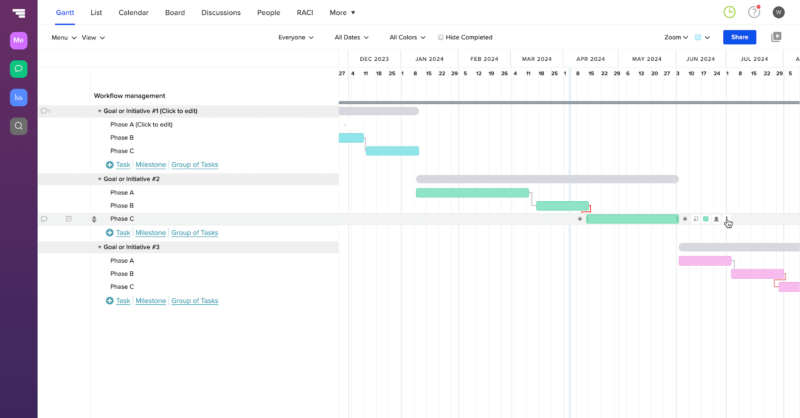
create Gantt charts for the Waterfall project.
- Sequential phases: Projects are divided into distinct phases including requirements, analysis, design, implementation, testing, deployment and maintenance. You can move on to the next phase only after completing the previous one.
- Rigid planning: The Waterfall approach involves detailed planning and documentation up front. Changes are hard to make once the project begins.
- Fixed scope: The scope of work is defined at the start of the project and remains fixed throughout its life cycle. This can help prevent scope creep and ensure clear expectations, but it also restricts stakeholder and client input during the project.
- Limited customer involvement: Customers are typically only involved in the initial requirements phase and the final testing or deployment stages. They have little involvement during the development stage.
- Suitable for well-defined projects: While the Waterfall model is suitable for projects with well-defined requirements and minimal changes, it may not be as effective in dynamic environments where requirements are constantly changing.
Characteristics of Agile Project Management
Agile project management is an iterative method that emphasizes flexibility, collaboration and continuous development. This project management approach, which is discussed in the Agile Manifesto, is ideal for projects with rapidly changing requirements like software project management. The characteristics of Agile projects are as follows:
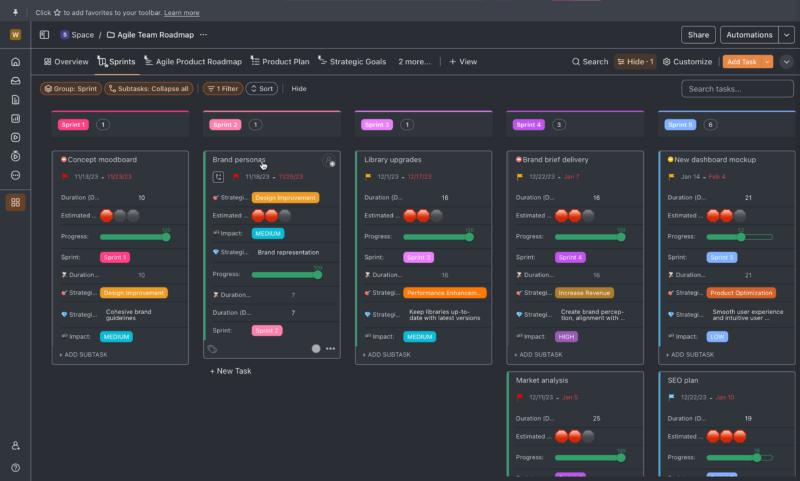
to collaborate and quickly adapt to changing requirements.
- Iterative development: Projects are divided into short iterations or sprints. Each iteration delivers a product increment. Following this style of work allows for early feedback and adjustments. Use one of the best Agile tools to plan your sprints.
- Continuous improvement: With regular feedback loops from sprint reviews and sprint retrospectives, project teams can identify issues, evaluate what worked well and implement changes promptly.
- Customer-centric: Agile methodology prioritizes customer satisfaction, so Scrum teams frequently involve customers and stakeholders throughout the development process to ensure the end product meets their needs.
- Team collaboration: Cross-functional teams work together closely by communicating frequently and regularly sharing progress to ensure transparency and alignment with shared goals.
- Adaptability: Agile projects are designed to be flexible and adaptable to changing requirements or priorities. Teams need to stay responsive, refine backlogs and adjust project plans quickly based on feedback.
Characteristics of Adaptive Project Management
The adaptive project framework (APF), introduced by Robert K. Wysocki in 2010, is a hybrid project management approach that is part of the Agile methodology group. It aims to combine the strengths of traditional and Agile approaches while eliminating their disadvantages.
The APF approach is useful when managing complex and change-driven projects. It helps teams adapt continuously to a project’s changing environment. Here are the characteristics of adaptive project management:
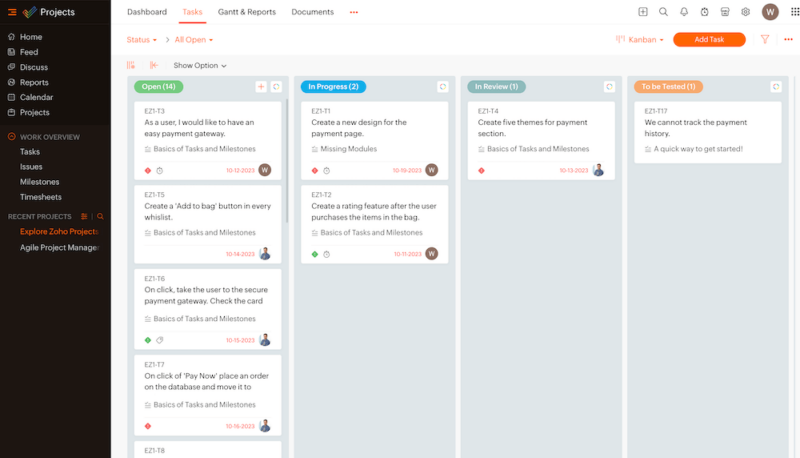
- Client-focused: An APF project team brings the client and development teams together. The client is engaged in project tasks during every stage of the process, and their needs must always take priority.
- Structured framework: The APF method provides a structured framework that includes project scope, planning, building, client checkpoints and post-version reviewing. It also allows for flexibility and adaptation throughout the project.
- Incremental delivery: Project tasks are divided into smaller increments, allowing for early and frequent delivery to gather client feedback.
- Continuous learning: Project managers in APF regularly improve their decisions and practices throughout the project based on the lessons learned from previous results.
- Avoidance of future speculation: APF prioritizes doing work that adds value as defined by the client over future speculation, which can result in a low-value project task.
Characteristics of Project Management Methodologies Training
Whether you’re new to the project management field or you’re a seasoned pro, certifications can help enhance your skills and advance your career. We’ll provide you with some popular project management certifications. Be sure to give our best project management certifications article a read for more training options.
- Project Management Professional (PMP): Offered by the Project Management Institute (PMI), the PMP certification is globally recognized and suitable for experienced project managers. It validates your ability to lead and direct teams effectively.
- Certified Associate in Project Management (CAPM): The CAPM certification is another option that the PMI provides for people with little to no project management experience. It demonstrates that you possess foundational project management knowledge and skills.
- Certified ScrumMaster (CSM): Provided by the Scrum Alliance, this certification trains you to become a Scrum Master and teaches you to facilitate Agile practices within a team using the Scrum framework. It highlights your knowledge of Scrum and its values.
- PMI-Agile Certified Practitioner (PMI-ACP): The PMI-ACP certification focuses on Agile practices and principles. It showcases your ability to lead an Agile team using frameworks like Scrum, XP and Lean.
Project Management Characteristics Resources: PDF and PPT
We have compiled a list of reliable resources that offer comprehensive explanations, examples and templates about project management.
- The Project Management Starter Guide for Non-Project Managers [PDF]: This starter guide created by Workzone explains the basic knowledge of project management, such as what project management is, the necessary skills and the phases of projects.
- Free PDF Project Management Templates: Smartsheet’s article provides a roundup of project management templates, project charters, project schedules and more.
- Visual Project Management Templates [PPT]: Office Timeline’s free PowerPoint and Excel templates will help you create unique, professional project visuals for your next stakeholder meeting.
- KICKOFF™: The PMI’s free project management course teaches you how to manage projects effectively, even if you aren’t a project manager.
Qualities of an Effective Project Manager
Effective project managers require more than just an understanding of project characteristics and frameworks — they also need certain project management skills and qualities. We’ll delve into some key skills and qualities that are essential for success in this field.
- Leadership skills: A good project manager inspires the team by setting a positive example, motivating team members to perform at their best, and fostering a collaborative and supportive work environment.
- Clear communication: Project managers ensure that every team member understands their roles and responsibilities while keeping everyone focused on a shared objective.
- Problem-solving abilities: Managers often encounter unexpected challenges, so they require strong problem-solving skills to analyze situations, identify creative solutions and proactively implement strategies to overcome obstacles.
- Flexibility and adaptability: Projects often involve changes. Being able to adapt to changing requirements or unexpected issues allows project managers to navigate the project toward success.
Final Thoughts
Project management is continuously evolving with new technologies, methodologies and best practices. It is essential to understand the project characteristics of different methods and stay up-to-date with developments. This will not only help organizations select the most suitable approach for their projects, but it will also increase project performance.
The Waterfall approach is ideal for projects with clearly defined requirements, while Agile methods and frameworks are best for projects with fluctuating requirements. The APF method combines structure and agility, allowing for continuous adaptation. With these characteristics in mind, you’ll be able to choose a project management approach that suits your specific project.
Don’t forget to use the event chain methodology to mitigate risks and events that could impact your project. Plus, for a tool that helps teams identify key elements of a project, check out our guide on Opportunity Canvas.
Now, we’d like to hear from you: What project management methodology does your organization currently employ? How well does it align with the project characteristics discussed in this article? What qualities do you believe are most crucial for a successful project manager? Share your experiences in the comments below. Thank you for reading!
FAQ: Key Characteristics of Project Management
The five key characteristics include clear project objectives, defined time frames, a life cycle, resource management and communication.
The seven key characteristics of a project are clear project objectives, defined time frames, a life cycle, resource allocation, communication, risk management and uniqueness.
The four essential characteristics of a project are clear project objectives, defined time frames, resource management and communication.
The top three characteristics of the best project managers are strong leadership, communication and problem-solving skills.


